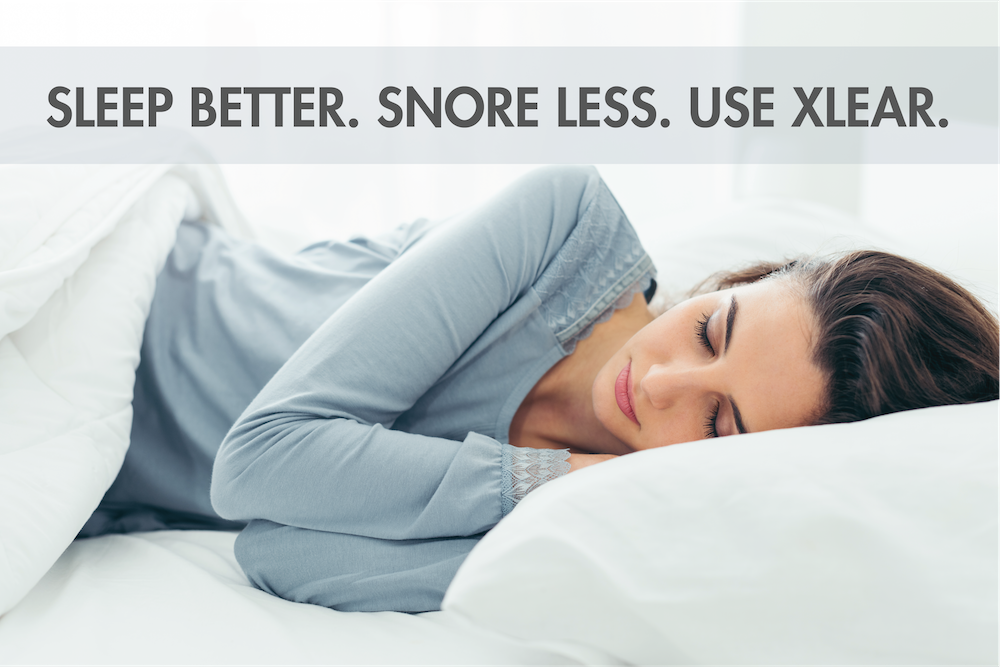
07 Nov Sleep Better. Snore Less. Use Xlear.
A Good Night’s Sleep
Your body functions on a sleep-wake cycle called the circadian rhythm. Staying in sync with this rhythm is vital to maintaining the overall health of the body, including mental health. Fail to maintain a proper sleep-wake cycle, and your immune system could drastically decrease, you will be less alert during the day, and you could even gain weight.
To get a good night’s sleep, establish a habit of going to bed and waking up at the same time every day. Just as too little sleep can be unhealthy, too much sleep can be detrimental to your health as well, and can lead to such issues as heart disease and diabetes. Studies have shown and adult needs between seven and nine hours of sleep per night, so make sure to plan your sleep and wake times accordingly.
Snoring
One of the most prevalent causes of a bad night’s sleep is snoring. Though it can be quite annoying for the person who has to hear the racket all night long, the person snoring also suffers from a lack of deep sleep, leaving them tired and unwell. Snoring happens from having a blocked airway caused by mucus or something similar in the nose, or by some kind of tissue obstruction from being overweight, having low muscle tone, or a malformed airway. The first step to ensure you have an open airway is to clear the nose of any mucus and contaminants, and reduce nasal swelling.
For whatever reason, men more commonly suffer from snoring. Especially during this Father’s Day, consider giving your loved one the gift of health and a good night’s sleep. Learn more about Xlear Nasal Spray and see how it can help him breathe better, sleep better, and feel better (and you may just get some of those benefits too).
Common Bad Sleeping Habits
Many people have established habits of unhealthy behavior during, and even prior to sleep, which effects how well the body recovers during the night. To get a good night’s sleep you should avoid:
- Bright Screens
Tablets, phones, laptops, televisions—all of these emit blue light, which disturbs sleeping patterns. Try avoiding screens for an hour or so before bedtime, and turn down the brightness to avoid too much light.
- Bedtime Snacks
While some people can sleep better with a bedtime snack, most foods at bedtime will disrupt your sleep by causing the stomach acids to engage in the digestive process, which can keep you awake.
- Sleeping with Music On
Though some people feel they can sleep better with music, having noise with a melody or rhythm (like music) activates the brain, inhibiting it from getting the necessary rest and revitalization. However, having white noise of some kind can help a person sleep.
- Sleeping In
Hitting the snooze button is so easy, but as we’ve pointed out, too much sleep can be a bad thing. Not only does sleeping in affect your health, but doing so can determine how the rest of your day goes.
- Warm Bedroom Temperatures
Your temperature drops slightly as your body recognizes it is close to sleep. A warm room raises body temperature, and makes it harder to sleep—not to mention, waking up in a sweat isn’t very comfortable. Keeping your room cool will help your body stay regulated throughout the night.
How Sleep Works
Brainwaves are categorized in several classes. While awake, the brain experiences alpha and beta brainwaves, and while asleep, theta and delta brainwaves occur. As a person falls deeper into sleep, the brainwave patterns slow down. The reason people in a deep sleep are hardest to wake up is because their brainwaves are in the delta phase, the slowest pattern.
Brainwaves don’t remain docile through the whole night, however. Most people experience up to five cycles of REM sleep each night, during which the brainwave patterns speed up to the levels we experience while awake. REM cycles are the times during the night when we dream. Both REM and non-REM sleep cycles are vital to getting a good night’s sleep.
Keep Your Airways Clean with Xlear
Just like your body temperature and brainwave patterns, your breathing decreases while asleep. Most people find that breathing through the nose is the easiest way to fall asleep. However, no matter how you fall asleep best, make sure you’re breathing properly, to avoid issues such as headaches, sleep apnea, and snoring.
If you are congested in the chest or nasal passage, your breathing at night will be hampered, and your REM and non-REM cycles will suffer. This is one reason why so many people with chest colds and the flu have trouble sleeping through the night.
No matter what is causing congestion, keeping your airways clear is necessary to enabling a good night’s sleep. If you’re in need of a solution to nasal congestion, try Xlear, a xylitol infused natural nasal spray designed to wash the nasal passage and help keep it clean from allergens and other airborne irritants that cause congestion and prevent you from sleeping well.





